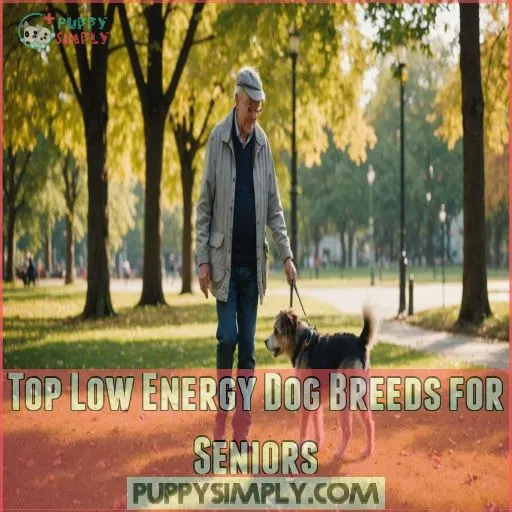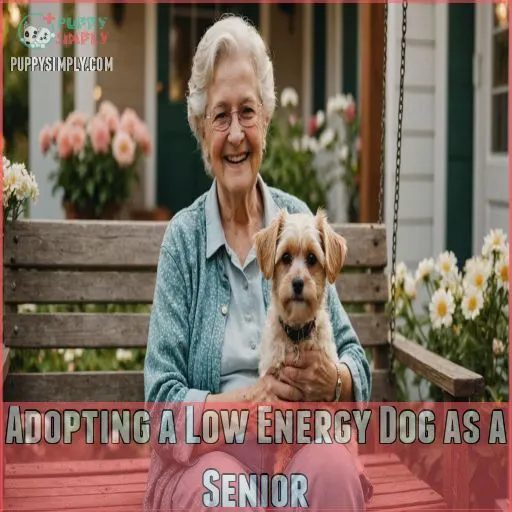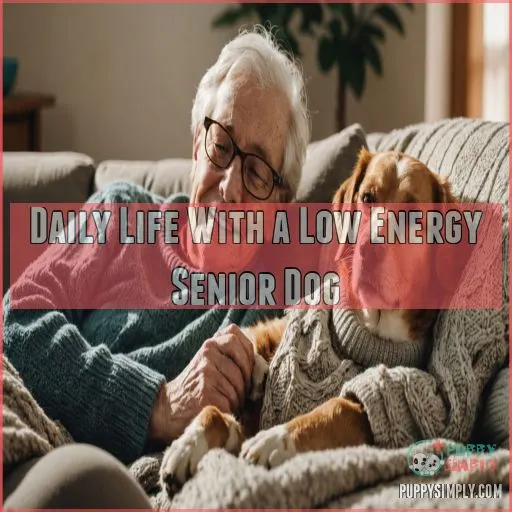This site is supported by our readers. We may earn a commission, at no cost to you, if you purchase through links.

Breeds like the Cavalier King Charles Spaniel, Bichon Frise, and Pomeranian offer the ideal blend of affection, adaptability, and minimal exercise needs.
These pups are natural therapists, providing companionship and reducing loneliness, while their gentle nature and manageable size make them easy to care for.
With lower maintenance requirements and the ability to facilitate social interaction, low-energy dogs can truly enhance the quality of life for active seniors.
Get ready to embrace the joys of a loyal, laid-back canine companion.
Table Of Contents
- Key Takeaways
- Benefits of Low Energy Dogs for Seniors
- Top Low Energy Dog Breeds for Seniors
- Characteristics of Ideal Senior-friendly Dog Breeds
- Health Considerations for Low Energy Senior Dogs
- Adopting a Low Energy Dog as a Senior
- Daily Life With a Low Energy Senior Dog
- Frequently Asked Questions (FAQs)
- Are dog breeds good for seniors?
- Is a low energy dog a good choice?
- What are the best small dogs for seniors?
- Should seniors choose a high-energy or low-energy dog?
- What should seniors look for in a small dog breed?
- Which dog breed is best suited for a relaxed lifestyle?
- What is the easiest dog for seniors?
- What is the best dog for a low-energy person?
- What is the best non shedding dog for the elderly?
- What is the best dog for lazy owners?
- What grooming needs do low energy breeds have?
- How do low energy breeds affect social life?
- Should seniors consider adopting senior rescue dogs?
- What space requirements suit low energy dogs?
- Are mixed breeds suitable low energy companions?
- Conclusion
Key Takeaways
- Low-energy dogs like Bichon Frises and Pomeranians are perfect for seniors who want companionship without the chaos. They’re like having a furry Netflix buddy rather than a marathon partner, and they won’t drag you on a hike when all you want is a stroll.
- These laid-back pups are natural therapists. Imagine snuggling up with a fluffy friend who melts away loneliness and stress without batting an eyelash. You’ll feel all the unconditional love without the exhausting workout plan.
- With low-maintenance needs and a calm demeanor, these dogs are like the easygoing friends who don’t mind watching reruns. They won’t keep you tethered to a grooming table, making your golden years more peaceful.
- Adding a low-energy dog to your life will enhance your social life, often becoming your furry wingman at parks and dog-friendly cafes. They bring structure and routine, ensuring your day is as delightful as a well-planned dinner party with an old friend.
Benefits of Low Energy Dogs for Seniors
If you’re a senior looking for a furry friend, low-energy dog breeds might be your perfect match.
These laid-back pups offer a host of benefits suited to your golden years.
Companionship without the chaos and a gentler approach to pet ownership are just a few of the advantages.
Improved Companionship and Mental Health
Imagine this: a furry friend snuggled up beside you, tail wagging contentedly.
Low-energy dogs can be a senior’s best ally in the battle against loneliness and stress.
These lazy pups offer more than just companionship; they’re natural therapists, reducing anxiety and boosting your mood .
With a four-legged friend by your side, you’ll have a renewed sense of purpose and a constant source of unconditional love, making each day brighter .
Reduced Physical Strain and Injury Risk
While owning a dog can be rewarding, low-energy breeds are particularly beneficial for seniors with mobility limitations.
These relaxed pups reduce the risk of falls and injuries associated with more active dogs.
You’ll appreciate their calm nature, especially if you’re dealing with arthritis or joint issues .
- Minimize strain during walks
- Reduce the need for strenuous play
- Decrease the likelihood of accidental trips or pulls
Lower Maintenance and Care Requirements
Low-maintenance dog breeds are a senior’s best friend in terms of care requirements.
You’ll find these lazy pups require less hands-on attention, making your golden years more relaxed.
Let’s take a look at how some popular breeds stack up:
| Breed | Grooming | Exercise | Vet Care |
|---|---|---|---|
| Bichon Frise | Moderate | Low | Average |
| Pug | Low | Minimal | Above Average |
| Cavalier King Charles Spaniel | Moderate | Moderate | Average |
| Pomeranian | High | Low | Average |
| Shih Tzu | High | Low | Average |
These breeds offer a perfect balance of companionship without overwhelming demands .
Increased Socialization Opportunities
Low energy dogs aren’t just easy to care for—they’re social butterflies in disguise!
These laid-back pups can be your ticket to a bustling social life.
They’re perfect companions for:
- Leisurely strolls in the park, where you might bump into other dog lovers
- Relaxed visits to dog-friendly cafes, sparking conversations over coffee
- Gentle playdates with other seniors’ pets, fostering new friendships
You’ll find yourself chatting with neighbors, swapping stories at the dog park, and joining senior groups for social walks .
It’s like having a furry wingman for your golden years!
Enhanced Sense of Purpose and Routine
Owning a low-energy dog can breathe new life into your golden years.
These furry friends provide structure and purpose, transforming your daily routine into a delightful dance of companionship.
Let’s explore how these lazy pups can enhance your retirement:
| Activity | Benefit for You | Benefit for Dog | Time of Day |
|---|---|---|---|
| Morning walk | Gentle exercise | Bathroom break | 8:00 AM |
| Feeding time | Responsibility | Nutrition | 9:00 AM & 5:00 PM |
| Cuddle session | Stress relief | Bonding | 2:00 PM |
| Evening stroll | Fresh air | Mental stimulation | 7:00 PM |
Top Low Energy Dog Breeds for Seniors
Looking for a furry friend to keep you company in your golden years?
You’re in luck – we’ve rounded up 8 low-energy dog breeds that are perfect for seniors who want all the love without the exhaustion.
Cavalier King Charles Spaniel
These regal pups are a match made in heaven for seniors seeking a low-key companion.
With their gentle temperament and affectionate nature, Cavalier King Charles Spaniels excel as therapy dogs .
They’re adaptable to apartment living and only need moderate exercise .
While they do require regular grooming, their sweet disposition and willingness to please make training a breeze .
Just be mindful of potential health issues and keep them on a leash outdoors.
Bichon Frise
You’ll often find the Bichon Frise topping lists of perfect pups for seniors.
These fluffy little charmers are like walking clouds of joy, weighing in at a manageable 7-12 pounds .
With their gentle nature and affectionate temperament, they’re ideal companions for retirees.
While they do require regular grooming, their low-shedding coat is a blessing for allergy sufferers.
Plus, a daily 30-minute stroll keeps both you and your Bichon in tip-top shape.
Greyhound
After a lifetime of racing, greyhounds often make surprisingly lazy companions in retirement.
These gentle giants are known for their:
- Calm temperament
- Low exercise needs
- Adaptability to small spaces
Don’t let their athletic past fool you – most greyhounds are content with short walks and long naps. They’re like couch potatoes in sleek, elegant packaging! Just be prepared for potential health issues and escape artist tendencies.
French Bulldog
Snuggle up with a French Bulldog, the perfect companion for your golden years.
These lovable pups are known for their friendly temperament and manageable size .
While they may have a wrinkled face that needs some TLC, their grooming needs are relatively low.
| Trait | Description | Benefit |
|---|---|---|
| Exercise | Low energy | Easy to manage |
| Temperament | Affectionate | Great company |
| Size | Compact | Suitable for apartments |
Pomeranian
With their fluffy coats and foxy faces, Pomeranians make delightful companions for seniors seeking a low-energy pup. These tiny charmers, weighing just 3-7 pounds, are perfect for apartment living .
Despite their small size, Poms have big personalities:
- Alert little watchdogs with a tendency to bark
- Intelligent and keen to learn tricks
- Affectionate lap dogs as they age
- Excellent companions for elderly folks
- Adaptable to various living situations
Regular grooming and short daily walks keep these pint-sized pooches happy and healthy .
Bulldog
Bulldogs are the epitome of lazy charm, making them a perfect match for seniors seeking a low-key companion.
These wrinkly-faced pups are known for their gentle nature and adaptability to different living situations .
While they may look tough, Bulldogs are sweet-natured couch potatoes who’d rather snooze than cause a ruckus.
| Bulldog Traits | Senior-Friendly? | Notes |
|---|---|---|
| Temperament | ✅ | Gentle, friendly |
| Exercise Needs | ✅ | Low-maintenance |
| Grooming | ⚠️ | Regular wrinkle cleaning |
Basset Hound
Droopy-faced and charming, Basset Hounds are perfect companions for seniors seeking a low-key friend.
These stocky pups may not be the most energetic, but they’re intelligent and friendly, making them ideal family dogs .
You’ll love their easygoing nature, though be prepared for their loud, distinctive bark.
With moderate exercise needs and a penchant for tracking smells, they’ll keep you entertained without overwhelming you .
Whippet
You might be surprised to learn that Whippets, known for their speed, can also be couch potatoes.
These sleek dogs are gentle, affectionate, and adaptable to various living situations.
They’re perfect for seniors who enjoy short bursts of activity followed by long naps.
Whippets have minimal grooming needs and are generally healthy, though they may be prone to deafness .
Don’t forget to keep them warm – their thin coats make them sensitive to chilly weather!
Characteristics of Ideal Senior-friendly Dog Breeds
When picking a furry companion for your golden years, certain traits can make all the difference.
Let’s explore the key characteristics that make a dog breed ideal for seniors, from their energy levels to their grooming needs.
Moderate to Low Energy Levels
When choosing a canine companion for your golden years, moderate to low energy levels are key. These breeds won’t have you running marathons but will still keep you active enough to stay healthy . Think of them as the perfect Netflix-and-chill partners!
- Couch potato extraordinaires
- Masters of the leisurely stroll
- Champions of the afternoon nap
- Experts in the art of gentle play
Remember, even low-energy pups need some exercise to stay happy and healthy .
Smaller Stature and Manageable Weight
Choosing a smaller, lighter breed can make all the difference in your golden years. Most senior-friendly dogs weigh between 7-16 pounds , making them easy to handle and less likely to cause accidents.
These pint-sized pooches are perfect for apartment living and won’t strain your joints during walks. Plus, their compact size means they’re easier to groom, bathe, and even snuggle up with on the couch!
Gentle Temperament and Affectionate Nature
Discovering a canine companion with a gentle temperament and affectionate nature can be a game-changer for seniors.
These furry friends offer unwavering loyalty and endless cuddles, creating a warm, comforting atmosphere in your golden years.
Breeds like the cavalier king charles spaniel and Bichon Frise are known for their loving dispositions .
They’re not just pets; they’re heart-warming companions that’ll stick to you like glue, ready to shower you with unconditional love.
Minimal Grooming Needs
In light of your golden years, you’ll want a furry friend that won’t keep you tied to the grooming table. Low-maintenance pups are a senior’s best bet.
Consider breeds with short, sleek coats that don’t shed much, like Pugs . They’re easy to care for, needing just occasional baths and quick brushes.
For those who enjoy a bit of pampering, Bichon Frises offer a happy medium – monthly groomer visits keep them looking dapper .
Adaptability to Different Living Situations
When you’re looking for a furry friend in your golden years, adaptability is key.
You’ll want a pup that can roll with the punches, whether you’re downsizing to a cozy apartment or planning to travel more.
Breeds like the Cavalier King Charles Spaniel and bichon frise are pros at adjusting to new environments (Source).
These easy-going companions will be just as happy curled up on your lap in a tiny studio as they’d be in a sprawling house.
Low Tendency to Bark Excessively
A quiet dog can be a godsend for seniors seeking peace and tranquility.
You’ll appreciate breeds with a low tendency to bark excessively, especially if you live in an apartment or close-knit community.
- French Bulldogs: Known for being less vocal
- Cavalier King Charles Spaniels: Quiet and patient
- Greyhounds: Calm and less likely to bark
- Shih Tzus: Generally quieter than other small dogs
Health Considerations for Low Energy Senior Dogs
While low-energy dog breeds can be perfect companions for seniors, it’s essential to understand their specific health needs.
You’ll want to be aware of common health issues, proper nutrition, and exercise requirements to keep your lazy pup happy and healthy throughout their golden years.
Common Health Issues in Low Energy Breeds
Everyone loves a lazy pup, but some health issues can sneak up on low-energy breeds.
Brachycephalic Syndrome affects flat-faced cuties like Bulldogs, while joint problems can plague larger breeds .
You’ll want to keep an eye on your pooch’s waistline too, as obesity is a common concern.
Skin allergies and dental care shouldn’t be overlooked either.
Remember, even couch potatoes need regular check-ups to stay in tip-top shape!
Importance of Regular Veterinary Check-ups
Why are regular vet check-ups really important for your low-energy senior pup?
These visits allow your veterinarian to establish a baseline for your dog’s health and detect early signs of disease or aging changes .
Don’t wait until your furry friend shows symptoms – pets often hide pain and illness.
Routine check-ups help build a strong relationship with your vet team, ensuring better care as your lazy companion gracefully ages.
Proper Nutrition and Weight Management
Proper nutrition is the backbone of your senior pup’s health.
You’ll want to keep a watchful eye on their weight, as those lazy bones can pack on pounds faster than you can say "walkies!" .
Aim for a diet higher in protein to maintain muscle mass, and consider omega-3 fatty acids for joint health .
Remember, treats should be given in moderation – your furry friend’s puppy-dog eyes might be irresistible, but their waistline will thank you later!
Exercise Requirements for Low Energy Dogs
While low energy dogs don’t need intense workouts, they still require some exercise to stay healthy.
You’ll want to take your pup for short, leisurely walks once or twice a day .
This keeps their joints limber and weight in check.
Some gentle play in the yard or living room can also do wonders.
Remember, even couch potatoes need a bit of movement to stay happy!
Mental Stimulation and Enrichment Activities
Even couch potatoes need brain workouts! Your low-energy pup still craves mental stimulation.
Try interactive toys or puzzle feeders to keep their mind sharp .
Shake things up with training games or scent work – hide treats around the house for a doggy treasure hunt .
And don’t forget social play! A gentle romp with a canine buddy can be just the ticket for your senior’s cognitive health.
Adopting a Low Energy Dog as a Senior
You’ve decided to bring a furry companion into your golden years – congratulations!
Before you rush out to adopt your new best friend, let’s walk through some key considerations to make sure you find the perfect low-energy pup for your retirement lifestyle.
Choosing Between Puppies and Adult Dogs
Now that we’ve covered health considerations, let’s talk about choosing between puppies and adult dogs.
It’s like deciding between a blank canvas and a masterpiece in progress.
Both have their charms, but here are three key factors to keep in mind:
- Energy levels: Puppies are adorable bundles of energy, while adult dogs often have a more settled temperament .
- Training needs: Adult dogs may already have some basic training (Source).
- Socialization: Puppies adapt more easily to new situations, but adult dogs can surprise you with their resilience .
Evaluating Shelter and Rescue Options
When you’re ready to find your perfect pup, shelters and rescues offer a treasure trove of options.
Volunteer opportunities abound, giving you a chance to meet potential furry friends before committing .
You’ll find a diverse range of breeds and personalities, from chihuahuas like Vernie to senior poodles like Patty Pood .
The adoption process is straightforward, with knowledgeable staff to guide you through breed availability and adoption fees.
It’s a rewarding journey to find your new companion!
Preparing Your Home for a New Dog
Before bringing your new furry friend home, it’s time to roll out the red carpet!
Dog-proofing your space makes sure a safe and welcoming environment for your low-energy companion.
Think of it as creating a cozy retirement villa for your pup.
- Clear paths by moving furniture to the room’s perimeter (Source)
- Invest in a cushy, comfortable bed for your senior doggy
- Install gates in potential danger zones to keep your pup safe
Understanding the Financial Commitment
Every penny counts in terms of your furry friend’s care.
Let’s break down the costs you’ll encounter as a senior dog owner:
| Expense | Monthly Cost | Annual Cost |
|---|---|---|
| Food | $30-$50 | $360-$600 |
| Vet Care | $25-$50 | $300-$600 |
| Grooming | $20-$40 | $240-$480 |
| Pet Insurance | $30-$50 | $360-$600 |
| Toys/Supplies | $10-$20 | $120-$240 |
Don’t let these numbers scare you off! With careful planning, you can manage these expenses and enjoy the priceless companionship of your low-energy pup .
Building a Support System for Dog Care
You’ve crunched the numbers, now let’s talk backup. Building a solid support system is key to enjoying life with your new furry friend.
Reach out to family, friends, and neighbors who can lend a hand when needed.
Look into local dog walkers and pet sitters for those busy days.
Find a trusted vet and connect with senior dog groups for advice and companionship.
Remember, it takes a village to raise a pup!
Daily Life With a Low Energy Senior Dog
You’ve chosen the perfect low-energy companion for your golden years, but now it’s time to settle into a comfortable routine together.
Let’s explore how to balance rest and gentle exercise,
create meaningful bonding activities,
and navigate the joys and challenges of daily life with your new furry friend.
Establishing a Comfortable Routine
Now that you’ve welcomed your low-energy senior pup home, it’s time to create a comfy routine.
Start by planning your day around key activities: feeding, potty breaks, short walks, and training sessions .
Consistency is key, but don’t be too rigid – flexibility helps prevent anxiety for both you and your furry friend .
Remember, even older dogs can learn new tricks, so sprinkle in some fun training moments to keep their minds sharp!
Balancing Rest and Gentle Exercise
After establishing a routine, it’s time to find the sweet spot between rest and gentle exercise for your senior pup.
Remember, even low-energy dogs need some activity to stay healthy.
- Aim for 30-60 minutes of daily exercise
- Take leisurely "scent walks" to engage their mind
- Try swimming for a joint-friendly workout
Listen to your dog’s cues and adjust as needed.
Your furry friend’s comfort always comes first!
Bonding Activities for Seniors and Dogs
Bonding with your low-energy pup doesn’t have to be a workout.
Gentle activities can strengthen your connection and keep both of you engaged.
Try teaching simple tricks or enjoying quiet cuddle time .
Take leisurely strolls together, adapting the pace to your comfort level.
Grooming sessions can become a cherished ritual with patience and treats.
Remember, shared moments of affection and quality time are the foundation of a strong human-canine bond .
Addressing Age-related Changes in Both Dog and Owner
While addressing age-related changes, both you and your furry friend can stay spry despite life’s hurdles.
Consider these adjustments:
- Joint health: Gentle exercises and comfortable bedding ease stiffness.
- Dietary adjustments: Tailor meals to support digestion and vitality.
- Cognitive decline: Regular mental stimulation helps keep their mind sharp.
Remember, adapting together means you both enjoy life to the fullest, even in retirement.
Incorporating the Dog Into Social Activities
Incorporate your low-energy dog into social activities by joining dog-friendly events and senior groups.
Explore dog parks and engage with community support networks.
Socializing offers you both a chance to build friendships and create heartwarming memories.
Imagine your pup as a wagging tail ambassador bridging connections—it’s like having a furry diplomat in your retirement circle!
Frequently Asked Questions (FAQs)
Are dog breeds good for seniors?
Dog breeds can be wonderful for seniors, offering companionship, reducing stress, and promoting an active lifestyle. Smaller, low-maintenance breeds like Bichon Frise, Maltese, and Shih Tzu are excellent choices .
Is a low energy dog a good choice?
Choosing a low-energy dog means you’ll enjoy a relaxed companion who requires less exercise, training, and grooming.
These dogs perfectly match a calmer lifestyle, providing companionship without overwhelming demands.
It’s a win-win for leisurely living! .
What are the best small dogs for seniors?
Imagine a companion that feels like a cozy blanket of love.
Bichon Frise, Pomeranian, or Maltese—they’re small, gentle, and perfect for seniors seeking a delightful blend of companionship and manageable care .
Should seniors choose a high-energy or low-energy dog?
For seniors, choosing a low-energy dog might be the best bet.
These pups enjoy laid-back companionship over constant activity,
allowing you to bask in mutual relaxation without the hectic demands of a high-energy counterpart .
What should seniors look for in a small dog breed?
Look for a small dog breed that’s low-maintenance, affectionate, and easy to train.
Consider breeds like the Maltese or Bichon Frise, which offer companionship without excessive exercise needs, making them perfect partners for an easy-going lifestyle .
Which dog breed is best suited for a relaxed lifestyle?
Find peace and tranquility with a Cavalier King Charles Spaniel – a regal breed known for its affectionate nature and tranquil temperament, perfect for a relaxed lifestyle.
What is the easiest dog for seniors?
The Maltese is a top pick for seniors seeking an easygoing companion.
This little furry friend is perfect for snuggling and enjoying leisurely days together .
It has low exercise needs and an affectionate nature.
What is the best dog for a low-energy person?
Saint Bernards, known for their relaxed temperament, are perfect for low-energy people.
They can be couch potatoes despite their size.
Just remember, every dog, no matter how laid-back, needs a bit of exercise .
What is the best non shedding dog for the elderly?
Consider a Bichon Frise for its hypoallergenic coat and minimal shedding.
These joyful, affectionate companions make great pets for seniors with allergies.
Plus, they’re low-maintenance and easy to manage at 7-12 pounds .
What is the best dog for lazy owners?
Yearning for a furry friend that aligns with your relaxed lifestyle? English Bulldogs and Basset Hounds are top picks for lazy owners, bringing cuddles over cardio and snoozing over sprints .
What grooming needs do low energy breeds have?
Low energy dog breeds, like Dachshunds and Pugs, need regular brushing to manage shedding and keep coats healthy.
Long-haired types require more attention to avoid mats, while smooth-coated ones need occasional grooming for a polished look .
How do low energy breeds affect social life?
Having a low-energy dog can be a social life boon, giving you the freedom to relax at home without stressing about constant walks.
They encourage a relaxed lifestyle and cozy gatherings without turning your home into a circus.
Should seniors consider adopting senior rescue dogs?
Adopting a senior rescue dog can be a wonderful choice for seniors, offering companionship, lower exercise needs, and the chance to give a deserving pup a loving home.
What space requirements suit low energy dogs?
Picture a cozy nook by a warm fireplace—small, low-energy dogs need little space, thriving in apartments with regular strolls and play.
Make sure their haven is safe, providing comfort and mental stimulation for their peace.
Are mixed breeds suitable low energy companions?
Mixed breed dogs can be great low-energy companions for seniors.
Their diverse genetics often lead to fewer health issues and a wide variety of sizes and temperaments, making them adaptable to many lifestyles and needs .
Conclusion
Adding a furry friend to your life can be the icing on the cake in your retirement years.
Low energy dog breeds for seniors, like Pomeranians and Bichon Frises, offer companionship without demanding energy levels .
They brighten your day, reduce loneliness, and fit snugly into your lifestyle.
By choosing one of these laid-back pups, you’re inviting love and laughter into your home while minimizing effort.
It’s truly a win-win for both you and your new canine pal.












